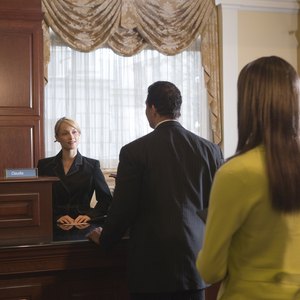
When a loved one dies, his bank accounts are not usually a top priority among his survivors. Yet dealing with bank accounts and other assets are among the tasks that must be performed to close the final chapters of the deceased’s life.
Types of Accounts
The disposition of a bank account after someone dies depends on the type of account the deceased held. The three most common types of personal bank accounts are individual accounts, joint accounts and trust accounts.
The owner of an individual account is the sole owner of all the money in the account, and only he can draw money from the account. A joint account is held by one or more owners, often a husband and wife. If the account specifies “or” between the names, either party can take money from the account without knowledge of the other. A joint account can also be set up with “and” between the names so that both parties must sign to withdraw money. A trust or custodial account can be a sole account or a joint account, but a beneficiary is named.
Disposition
When the sole owner of a bank account dies, the money ultimately goes to beneficiaries named in his will. The money in the account becomes part of the deceased’s estate and is distributed according to his beneficiaries.
If one owner of a joint account dies, the remaining owner becomes the sole owner of the account, and all assets belong to him. When the remaining owner dies, the proceeds go to the estate just as they do for any sole owner.
When an account names a “transfer on death” beneficiary and the owner dies, the money goes directly to the beneficiary named on the account. If the bank account is a joint account, all owners must be deceased before the beneficiary receives the funds.
Probate
If the deceased left a will, the executor of the will must see that the person’s assets are distributed according to the will’s instructions. The executor, who is either named in the will or appointed by the court, conducts the will through the probate process. He notifies the bank that the account holder has died and that the account must be closed. The executor then sets up a new bank account for the estate, and any funds remaining in the previous account are transferred to the estate account, along with the deceased’s other assets. The executor likely will need to provide a death certificate and other documentation to the bank.
Final Expenses
The surviving owner of a joint account can continue to write checks on the account, but should provide the bank with a death certificate to remove the deceased person’s name. When the sole owner of a bank account dies, no one is allowed to write checks on that account until the estate has been settled. An executor can request that a judge issue access to the account to pay such final expenses as funeral costs, but otherwise, forging a check or using a debit card belonging to the deceased is illegal.
References
- The People’s Law Library: Personal Bank Accounts
- Judith Fox Attorney at Law: Transfer of Assets at Death
- Nolo: What Does an Executor Do?
- Bankrate.com: When You Die, Is Your Bank Account in Limbo?
- Fifth Third Bank. "Estate Financial Planning Has Nothing to Do With Your Wealth." Accessed June 5, 2020.
- Bank of America. "Resources and Information," Page 3. Accessed June 5, 2020.
- AllLaw. "Claiming Money From a Payable-on-Death Bank Account." Accessed June 5, 2020.
- FindLaw. "Bank Account Beneficiary Rules." Accessed June 5, 2020.
- Texas Constitution and Statutes. "Estates Code - Chapter 113. Multiple-Party Accounts." Accessed June 5, 2020.
- Omaha Federal Credit Union. "How to Fill Out the Designation of Beneficiary Form." Accessed June 5, 2020.
- Nolo. "If a Beneficiary Dies Before You Do." Accessed June 5, 2020.
- Ohio Laws and Rules. "2131.10 Payable on Death Accounts." Accessed June 5, 2020.
- Alaska Court System. "Transfer on Death Deed." Accessed June 5, 2020.
Writer Bio
As a long-time newspaper reporter and staff writer, Kay Bosworth covered real estate development and business for publications in northern New Jersey. Her extensive career included serving as editor of a business education magazine for the McGraw-Hill Book Company. The Kentucky native earned a BA from Transylvania University in Lexington.

